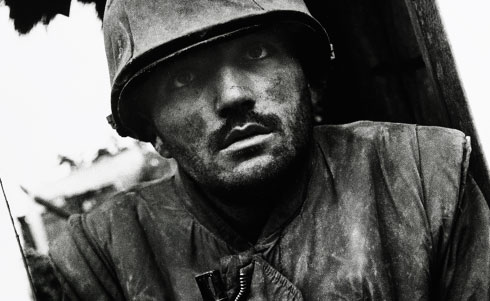After 2012's unofficial Year of the Documentary, 2013 begins brightly indeed with McCullin, David and Jacqui Morris's very fine profile of the Observer and Sunday Times photojournalist Don McCullin, witness to a half-century of global conflict. McCullin first came to prominence in the late 1950s with his studies of the teen gangs roaming the backstreets of his native North London, where a boy was supposed to stand up and fight for himself, not stand back and watch. Having survived this baptism of fire, he was duly dispatched by his editors to cover the building of the Berlin Wall, the war between Greek and Turkish Cypriots, the Congo, Biafra, Vietnam... As McCullin himself reflects, "in the Sixties, there were so many opportunities to go off to war" - and thus to earn one's stripes, whether with a camera or a gun.
The photographer's testimony is laced with ambivalence about his chosen profession: while he's happy to have had such a long and prosperous career, he's now taken so many pictures of death and destruction he wonders whether he's guilty of exploiting the vulnerability of his subjects. (A piercing observation here: McCullin notes how, in the middle of the worst carnage, people look up as though addressing God - providing very easy pickings for any photographer looking to record the agony passing over their features.) Yet it's precisely this ambivalence - the fact he's questioning his own motives for being in this situation, taking these pictures - that suggests McCullin hasn't lost his grip on humanity, his ability to be shocked, even as news of yet another conflict filters through.
It's a serious business, photojournalism - focusing our attentions, telling a story with a single image, reframing the world - and the Morrises opt for a sober yet effective approach, asking McCullin to discuss his experiences in broadly chronological order while the rostrum camera hovers over those images he's brought back from various fronts. In doing so, the film gives a sense of a body of work being accumulated, even as it picks out individual highlights and sets us to considering their ramifications: take the devastating shot of a dead Vietnamese soldier lying in the long grass, next to the photo of his sweetheart McCullin retrieved from the soldier's spilled belongings in order to make a point. The physical presence of the photographer - wisened, greying, but still lucid, energised and possessed of a wry sense of humour - speaks to McCullin's hardiness and skilled decision-making: put bluntly, he's survived his assignments, where so many of his colleagues (and, indeed, of his subjects) have been picked off. (As a stark ST magazine headline frames it: "WHY THEM AND NOT ME?)
Gradually, McCullin reveals itself as a story about the changing nature of journalism. The Sunday Times passes from the stewardship of Lord Thomson and editor Harold Evans (one of McCullin's most loyal admirers, interviewed here) to one Rupert Murdoch (more concerned with ad revenues than unvarnished global truths); photojournalists are tempted to shun risky freelance gigs in favour of being embedded with the troops, and effectively having all their decisions made for them by the authorities; the archive clips of McCullin's appearances on TV's Parkinson are themselves a reminder of a time when guests could be invited onto chatshows with nothing more to promote than a particular set of observations about the world. The Morrises leave McCullin in the snowy countryside, in a state of semi-retirement, but recent reports have him heading out to war again, this time in Syria: he's still snapping away, still questioning, still showing us where to look, if we care to.
McCullin is on release in selected cinemas.

No comments:
Post a Comment